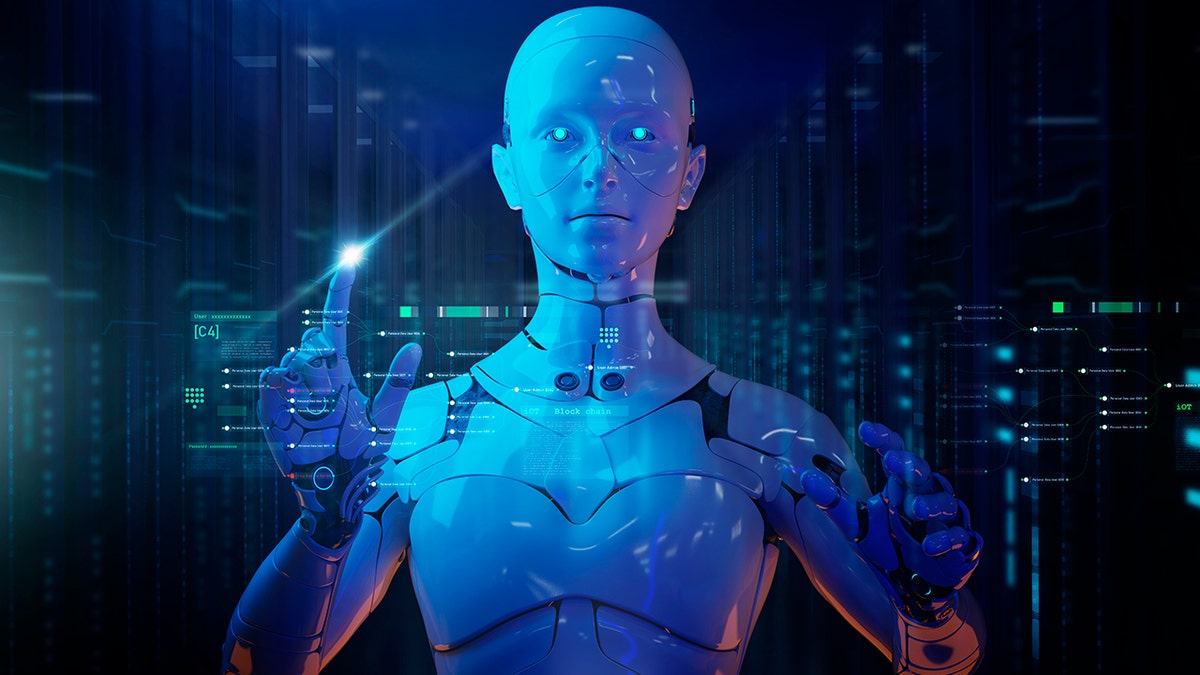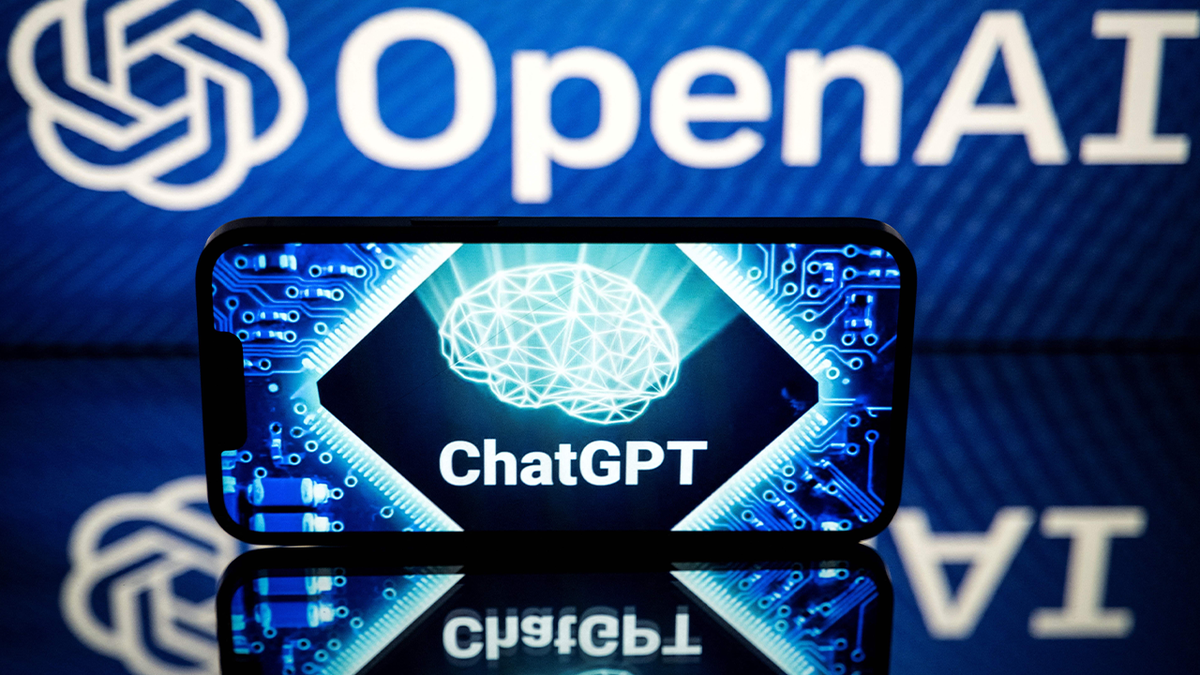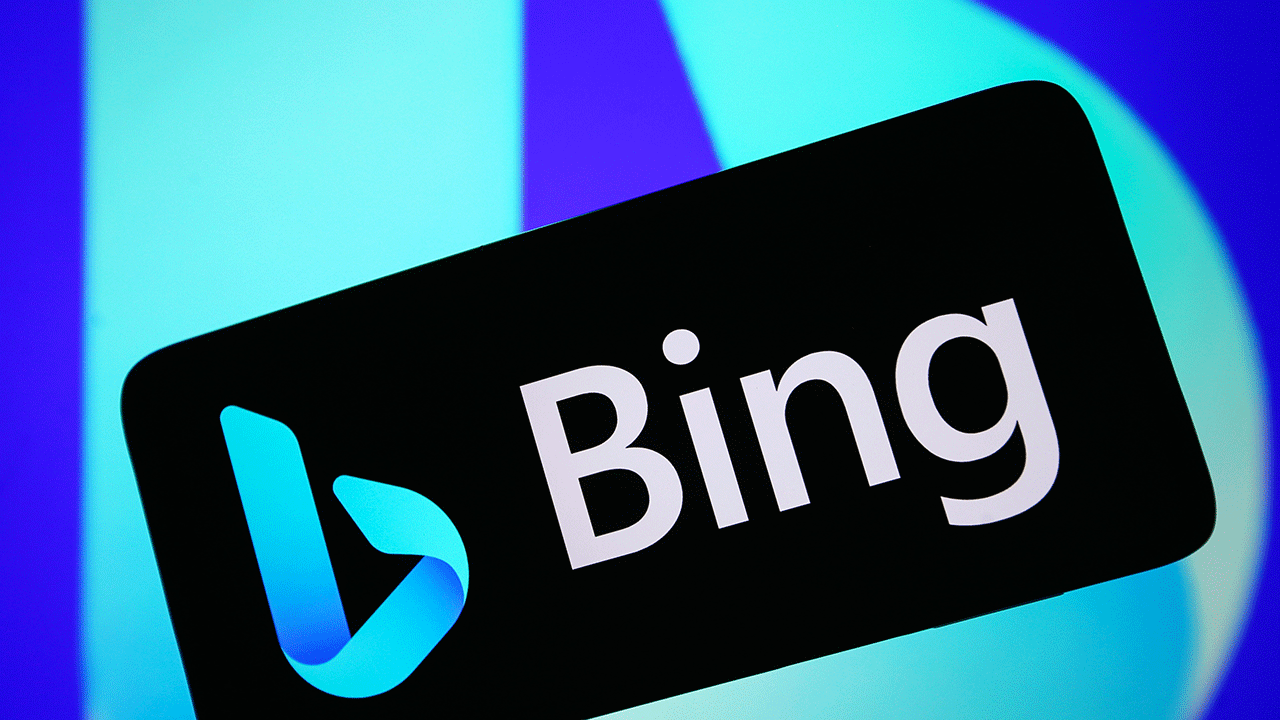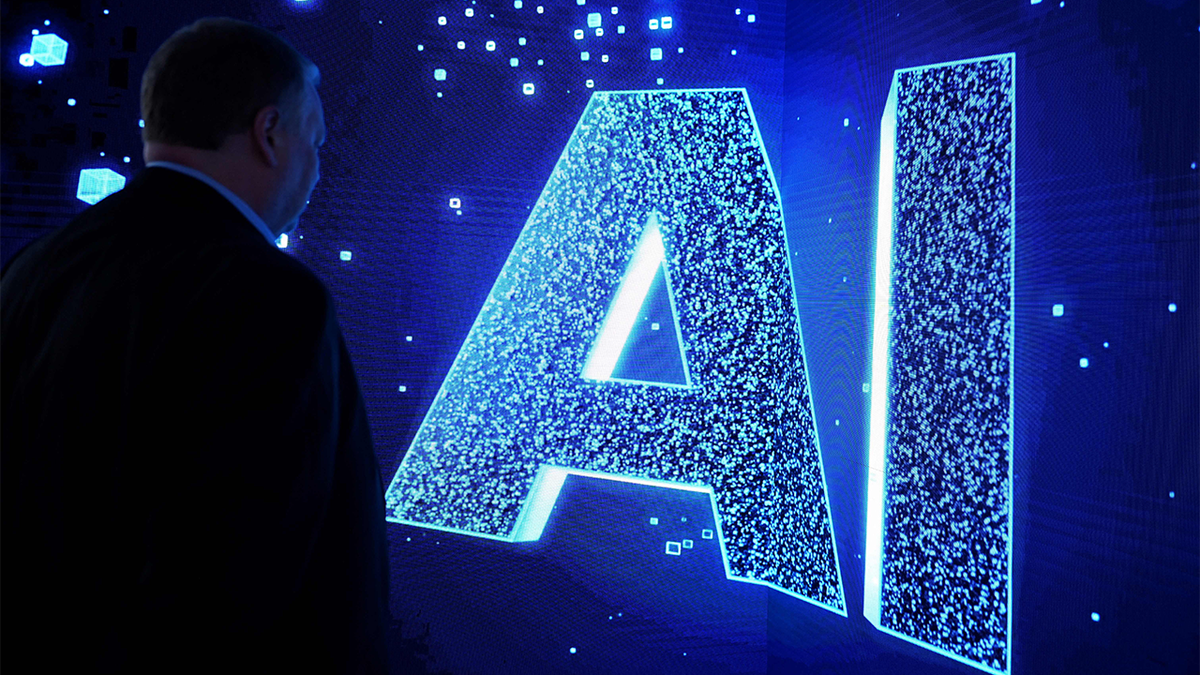Artificial intelligence could put jobs in jeopardy
FOX Business correspondent Lydia Hu has the latest on jobs at risk as AI further develops on 'America's Newsroom.'
The advancement of artificial intelligence is progressing at a breakneck pace. While the technology is changing rapidly, the basic principles behind AI aren't new.
Artificial intelligence has been around for many years, and has been expanded upon by many different developers. Today, some of the most well known AIs include chatbots like ChatGPT and Google Bard, with many more on the way.
These AIs have become more sophisticated and refined over the course of many iterations. These advancements are bringing AI to levels reaching what would be considered "strong AI," a machine that essentially has the same capabilities as a human mind.

There have been many artificial intelligence advancements in recent years, bringing software closer to reaching "strong AI" status. (iStock)
Following are links to articles that answer some of the most-asked questions about AI.
- What is AI?
- What are the four main types of artifical intelligence
- What is the history of AI?
- What are the dangers of AI?
- What is ChatGPT?
- What is Google Bard?
- How is Bing using ChatGPT?
- What is BERT?
- How do tech titans feel about AI? Thoughts from Elon Musk, Bill Gates and Mark Zuckerberg
- How does the government AI?
- Is AI ADA compliant?
- How is AI being regulated around the world?
- What AI are we already using in daily life?
- Are Alexa and Siri AI?
- What is Auto-GPT?
- AI education: Gather a better understanding of artificial intelligence with books, blogs, courses and more
- Will AI impact your job? Some industries the technology is likely to have major impacts on
- What are some controversies surrounding natural language processing?
- What is data science?
- How does an AI chatbot work?
- How to explain AI to children and tips for keeping them safe with scams on the rise
- What is voice cloning?
- What is text to video?
1. What is AI?
AI, or artificial intelligence, is a branch of computer science that is designed to understand and store human intelligence, and mimic human capabilities including completing tasks, processing human language and performing speech recognition. AI is the leading innovation in technology today and its primary goal is to eliminate tedious tasks and assist in immediately accessing extremely detailed and hyper-focused information and data.
2. What are the four main types of artifical intelligence?
The four main types of AI are reactive machines, limited memory, theory of mind and self-awareness. The most basic forms of AI are reactive machines and limited memory. Theory of mind and self-awareness are two stages in AI that are theoretical as of now, as they are still being developed. In the future, these two forms of AI could come to fruition. For a machine to reach the self-awareness stage of development, the most complex stage, it would need to possess the ability to form its own identity and become self-aware, as its name implies.
3. What is the history of AI?
While there are many recent developments in the AI field, its premise is not new, and the history of AI dates back to before chatbots. Some of the earliest names in AI were Alan Turing, who created the Turing machine, Warren McCulloch and Walter Pitts, who expanded upon Turing’s ideas and John McCarthy, who coined the term "artificial intelligence."
4. What are the dangers of AI?
The emergence of artificial intelligence has led to feelings of uncertainty, fear, and even hatred toward a technology that most people do not fully understand. AI can automate tasks that previously only humans could complete, such as writing an essay, organizing an event, and learning another language.
However, experts worry that the era of unregulated AI systems may create misinformation, cyber-security threats, job loss, and political bias.
5. What is ChatGPT?

OpenAI's ChatGPT is a newer development in AI. (Photo by LIONEL BONAVENTURE/AFP via Getty Images))
ChatGPT is a sophisticated artificial intelligence chatbot developed by AI research company OpenAI. The AI technology was added to Microsoft products including Bing, the corporation’s search engine.
ChatGPT is a generative AI that is capable of producing content from text to images, having conversations with humans, suggesting edits to computer programming code and more. The chatbot has the ability to answer questions or assist humans in queries or tasks through its vast training using social media, websites, articles, datasets, books and other forms of text on the internet.
6. What is Google Bard?
Bard is one of the newest artificial intelligence chatbots. The AI chatbot, created by Google, was released in March 2023, after an initial announcement in February. The software was released to a limited amount of users for testing.
The chatbot comes on the heels of the release of one of its major competitors, OpenAI’s ChatGPT, and has very similar functions to that model.
7. How is Bing using ChatGPT?

ChatGPT is used in Bing's new AI search engine program. (Pavlo Gonchar/SOPA Images/LightRocket via Getty Images)
Bing's new AI search engine program uses ChatGPT language modeling to provide its users with detailed human-like responses to questions and other inquiries.
Microsoft, which owns Bing, and Google are working to create the most interactive and accurate chatbot possible in order to drive more engagement from users.
8. What is BERT?
It is no secret that artificial intelligence impacts society in surprising ways. One way that most people have used AI without their knowledge is when searching on Google. When doing so, it is likely that the searcher unknowingly used BERT, or Bidirectional Encoder Representations from Transformers, in the form of an artificial intelligence algorithm since about 10% of all searches utilize it. This framework has allowed Google to recognize how users search by better understanding words within their correct order and context. BERT is more than just a part of Google’s algorithm, though. As an open-source framework, anyone can use it for a wide array of machine-learning tasks.
9. How do tech titans feel about AI? Thoughts from Elon Musk, Bill Gates and Mark Zuckerberg
With the growing presence of artificial intelligence in the everyday lives of people around the world, many tech leaders have spoken out about the controversial and revolutionary new technology.
Some of the biggest names in tech have differing opinions on AI and how it will impact society as a whole, but most argue that ultimately the technology will benefit humanity.

Elon Musk was one of the tech leaders who signed a letter urging government regulation on artificial intelligence. (Justin Sullivan/Getty Images)
10. How does the government use AI?
The United States government uses artificial intelligence in the military, intelligence, and law enforcement to help mitigate potential threats.
However, the use of machine learning technology largely remains unregulated by the government, although year-on-year spending on AI government contracts continues to increase.
11. Is AI ADA compliant?
Artificial intelligence is not intrinsically ADA compliant or not, but how it is used can either help or hinder the disabled, including those with vision and hearing impairments. When used within the hiring process, apprehension over whether AI allows for equal opportunities for candidates with disabilities, based on Title I of the Americans with Disabilities Act, has been scrutinized. On the other hand, AI has proven instrumental in improving the lives and independence of those with disabilities.
12. How is AI being regulated around the world?
With AI large language models like ChatGPT being developed around the globe, countries have raced to regulate AI. Some have drafted strict laws on the technology, while others lack regulatory oversight.
China and the EU have received particular attention, as they have created detailed, yet divergent, AI regulations. In both, the government plays a large role. This greatly differs from countries like the United States, where there is no federal legislation on AI. Government regulation comes as many countries have raised concerns about various aspects of AI. These mainly includes privacy concerns, and the potential for societal harm with the controversial software.

The four main types of artificial intelligence are reactive machines, limited memory, theory of mind and self-awareness. (JOSEP LAGO/AFP via Getty Images)
13. What AI are we already using in daily life?
Artificial intelligence may seem like an emerging technology bound for regular use by humans in the distant future, but there are various machine learning products that millions of people already use in their daily lives.
Machine learning technology is featured in a variety of everyday technologies, such as search engines, online shopping algorithms, navigation systems, and smartphones. Popular AI products can help you get from one destination to the next, search for facts about your favorite movie, or help you shop for a particular product online.
14. Are Alexa and Siri AI?
It might be some time before we see the futuristic concept of artificial intelligence that is depicted in science fiction novels and films come about in real life, but AI is still all around us.
Most homes have some form of voice assistant gadget, such as an Alexa smart home device or Siri assistant on an iPhone. These machines have developed the ability to learn and respond in a way similar to humans’ cognitive abilities, all thanks to artificial intelligence algorithms.

Amazon's Echo Dot smart speaker uses Alexa to communicate back and forth with the user. The device is powered by artificial intelligence to complete tasks and provide information when prompted. (Phil Barker/Future Publishing via Getty Images)
15. What is Auto-GPT?
You’ve probably heard of some of the biggest artificial intelligence chatbots being used and explored today, like ChatGPT and Google Bard. One artificial intelligence tool that may be new to you is Auto-GPT, an AI tool released at the end of March that is more advanced than both ChatGPT and Google Bard.
Auto-GPT is a step closer to creating what is known as "strong AI," a type of AI that is likely what we pictured when we thought of AI in the past. These depictions often feature robots with human-like capabilities that were only seen in futuristic science-fiction movies.
16. AI education: Gather a better understanding of artificial intelligence with books, blogs, courses and more
Artificial intelligence has recently become a hot topic around the world as tech companies like Alibaba, Microsoft, and Google have released conversational chatbots that the everyday person can use. While we're already using AI in our daily lives, often unknowingly, these forms of computer science are very interesting to a large population.
Some are hoping to simply learn to properly use the chatbots to make extra money on the side, experiment with robot interactions, or simply catch sight of what the fuss is all about. Others, however, are hoping to inspire change and become part of the history by physically advancing AI technology alongside tech tycoons.
17. Will AI impact your job? Some industries the technology is likely to have major impacts on
No matter what industry you work in, it is more than likely that artificial intelligence is going to impact your job in some capacity. That being said, it is going to affect some industries more than others.
Predicting what jobs will look like 20 years from now or even 10 for that matter is tricky. There are jobs that exist now that we couldn’t have imagined 10 years ago. So, there are certain things that AI is good at now, like coding, working with numbers, writing content, but it could do a lot more in the coming years.
Eighty percent of workers will have at least 10 percent of their work tasks affected by AI, according to researchers at OpenAI and the University of Pennsylvania, per the New York Times. Another report by Goldman Sachs reported by CNBC, predicted that AI could affect 300 million jobs.

The healthcare field will be heavily impacted by AI. (iStock)
18. What are some controversies surrounding natural language processing?
As machine learning technology continues to shock the world, popular artificial intelligence tools such as natural language processing may generate unforeseen issues for humanity.
For instance, natural language processing can have implicit biases, create a significant carbon footprint, and stoke concerns about AI sentience. Natural language processing is a field in machine learning where a computer processes human language through vast amounts of data to understand, translate, extract, and organize information. However, the language processing tools such as Open AI's Chat GPT and other tools run into some challenges, such as misspellings, speech recognition, and the ability of a computer to understand the nuances of human language.
19. What is data science?
Data science is an essential field within computer science and machine learning that uses statistics, algorithms, and technology to make meaningful analysis and predictions from large amounts of data.
For instance, computer scientists often describe data science as an interdisciplinary academic field combining various tools within the computer science world to extrapolate information and meaning from large amounts of structured and unstructured data. Some of the biggest corporations and technology firms in the world have a wide variety of means for collecting and storing information related to their customers and products.
20. How does an AI chatbot work?
Modern chatbots have become more than just customer support programs. Thanks to powerful breakthroughs in machine learning and natural language processing — two subsets of the field of artificial intelligence — people around the world are using chatbots to solve a host of problems and gain access to new conveniences.
21. How to explain AI to children and tips for keeping them safe with scams on the rise

It's important to start a conversation with your child about online safety with AI technology on the rise. (iStock)
Artificial intelligence can be a hard concept for adults to fully wrap their heads around, so explaining it to kids is even harder. Having to explain this technology to kids is fairly uncharted territory, but something necessary to do since they are more than likely being exposed to it every day.
Another layer of this is AI safety. Today, so many young children have smartphones of their own, meaning they have access to chatbots like ChatGPT and other AI-generated software. It’s important for kids to be briefed on internet safety before interacting with AI.
22. What is voice cloning?
Voice cloning through artificial intelligence is quickly becoming more advanced, more accessible and more widely used. While using artificial intelligence to clone voices can be beneficial in making certain work more efficient and assisting those who have lost their ability to speak, there are also many problems that have, so far, been hard to solve.
Anyone who has a phone, computer or similar technological device has access to voice cloning through a long list of available software. Even though some are more advanced and efficient than others, voice cloning as a whole is an extremely easy thing to do.
23. What is text to video?
Chatbots can write a story for you in seconds, image generators can produce high quality photos by being given just a few words, tools are out there that can clone a voice with just a few minutes of recorded video.









































